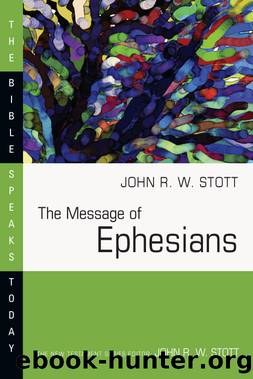The Message of Ephesians by John Stott

Author:John Stott [Stott, John]
Language: eng
Format: epub
ISBN: 9781783590599
Publisher: InterVarsity Press
Published: 2014-04-23T00:00:00+00:00
c. The purpose of spiritual gifts is service
In verse 12 Paul states clearly why Christ gave these gifts to his church. The RSV first edition (1946) read: for the equipment of the saints, for the work of ministry, for building up the body of Christ. It will be noted that according to this translation, Christ had three distinct purposes in mind. I think Armitage Robinson was the first commentator to insist that this was a mistake. âThe second of these clausesâ, he wrote, âmust be taken as dependent on the first, and not ⦠as coordinate with it.â7 In other words, the first comma (âthe fatal commaâ8)âwhich is âwithout linguistic authority but with undoubted ecclesiological biasâ9âmust be erased. If it is allowed to stand, we are faced with âa saddening resultâ, for âthe verse then means that only the special ministers, not all the saints, are called to do âthe work of ministryâ and to cooperate in the âbuilding of the bodyâ.â This interpretation âhas an aristocratic, that is, a clerical and ecclesiastical flavour, it distinguishes the (mass of the) âsaintsâ from the (superior class of the) officers of the churchâ.1
If the comma is erased, however, we are left with two purposesâone immediate and the other ultimateâfor which Christ gave gifts to his church. His immediate purpose was âto equip the saints for the work of ministryâ (RSV second edition 1971) or better âto equip Godâs people for work in his serviceâ (NEB), and his ultimate purpose âfor building up the body of Christâ.
The former expression about equipping Godâs people is of far-reaching significance for any true understanding of Christian ministry. For the word ministry (diakonia) is here used not to describe the work of pastors but rather the work of so-called laity, that is, of all Godâs people without exception. Here is incontrovertible evidence that the New Testament envisages ministry not as the prerogative of a clerical élite but as the privileged calling of all the people of God. Thank God that in our generation this biblical vision of an âevery-member ministryâ is taking a firm hold in the church.
It does not mean that there is no distinctive pastoral ministry left for clergy; rather it establishes its character. The New Testament concept of the pastor is not of a person who jealously guards all ministry in his own hands, and successfully squashes all lay initiatives, but of one who helps and encourages all Godâs people to discover, develop and exercise their gifts. His teaching and training are directed to this end, to enable the people of God to be a servant people, ministering actively but humbly according to their gifts in a world of alienation and pain. Thus, instead of monopolizing all ministry himself, he actually multiplies ministries.
What model of the church, then, should we keep in our minds? The traditional model is that of the pyramid, with the pastor perched precariously on its pinnacle, like a little pope in his own church, while the laity are arrayed beneath him in serried ranks of inferiority.
Download
This site does not store any files on its server. We only index and link to content provided by other sites. Please contact the content providers to delete copyright contents if any and email us, we'll remove relevant links or contents immediately.
The Five People You Meet in Heaven by Mitch Albom(3545)
The Secret Power of Speaking God's Word by Joyce Meyer(3142)
Real Sex by Lauren F. Winner(3000)
Name Book, The: Over 10,000 Names--Their Meanings, Origins, and Spiritual Significance by Astoria Dorothy(2962)
The Holy Spirit by Billy Graham(2932)
0041152001443424520 .pdf by Unknown(2833)
How The Mind Works by Steven Pinker(2801)
ESV Study Bible by Crossway(2768)
Ancient Worlds by Michael Scott(2661)
Churchill by Paul Johnson(2564)
The Meaning of the Library by unknow(2552)
The ESV Study Bible by Crossway Bibles(2543)
The Gnostic Gospels by Pagels Elaine(2515)
MOSES THE EGYPTIAN by Jan Assmann(2406)
Jesus by Paul Johnson(2347)
City of Stairs by Robert Jackson Bennett(2336)
The Complete Dead Sea Scrolls in English (7th Edition) (Penguin Classics) by Geza Vermes(2268)
The Nativity by Geza Vermes(2217)
Ancient Near Eastern Thought and the Old Testament by John H. Walton(2213)
